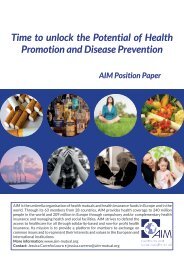Exploring patient participation in reducing health-care-related safety risks
Exploring patient participation in reducing health-care-related safety risks
Exploring patient participation in reducing health-care-related safety risks
You also want an ePaper? Increase the reach of your titles
YUMPU automatically turns print PDFs into web optimized ePapers that Google loves.
<strong>Explor<strong>in</strong>g</strong> <strong>patient</strong> <strong>participation</strong> <strong>in</strong> reduc<strong>in</strong>g <strong>health</strong>-<strong>care</strong>-<strong>related</strong> <strong>safety</strong> <strong>risks</strong><br />
98<br />
Information about <strong>health</strong> and <strong>safety</strong><br />
Patients are more likely to be <strong>in</strong>volved <strong>in</strong> their <strong>health</strong> <strong>care</strong> when thoroughly <strong>in</strong>formed (5),<br />
enabl<strong>in</strong>g them to make appropriate <strong>health</strong> decisions. Legally, the right to <strong>in</strong>formation<br />
about one’s own <strong>health</strong> is part of the right to <strong>in</strong>formed consent (30) (Table 6.1).<br />
Accord<strong>in</strong>g to Portuguese law, <strong>health</strong> <strong>in</strong>formation is any <strong>in</strong>formation directly or <strong>in</strong>directly<br />
l<strong>in</strong>ked to the present or future <strong>health</strong> status of a person, either liv<strong>in</strong>g or deceased,<br />
<strong>in</strong>clud<strong>in</strong>g cl<strong>in</strong>ical and family history (40). Article XIV of the Basic Law on Health, which<br />
regulates <strong>patient</strong>s’ rights and duties, states that a <strong>patient</strong> has the right to be <strong>in</strong>formed<br />
about their condition, possible treatment options and the possible evolution of the<br />
condition (31). The <strong>in</strong>clusion of the right to know the <strong>risks</strong> and secondary consequences<br />
of treatment, as well as the <strong>risks</strong> and consequences of refusal of the <strong>in</strong>tervention or of<br />
different options, should also be addressed, as suggested by the ERS (41).<br />
The Portuguese legal framework (30) states that <strong>patient</strong>s’ access to their personal <strong>health</strong><br />
data should be granted through an authorized physician and cannot be used for any<br />
purpose other than <strong>health</strong> <strong>care</strong> and research (30,31). The Health Systems Observatory<br />
objects to the fact that <strong>patient</strong>s can only access their personal data <strong>in</strong> the presence of a<br />
physician (42).<br />
The duty of <strong>health</strong> <strong>care</strong> professionals to expla<strong>in</strong> the diagnosis, <strong>in</strong>tervention/treatment<br />
and consequences to the <strong>patient</strong> is <strong>in</strong>dicated <strong>in</strong> the Portuguese penal code (43), except<br />
for <strong>in</strong>stances when this <strong>in</strong>formation can represent danger or harm to the <strong>patient</strong> (Article<br />
1.157). The right not to know is not specified <strong>in</strong> Law No. 12/2005 of 26 January 2005<br />
on Personal Genetic Information and Health Information (40), but is set out <strong>in</strong> the<br />
European Charter of Patients’ Rights (27), Article 4, which states that “a <strong>patient</strong> has the<br />
right to refuse <strong>in</strong>formation about his or her <strong>health</strong> status”.<br />
Informed consent and <strong>safety</strong><br />
Informed consent is one of the many processes used to ensure that <strong>patient</strong>s are engaged<br />
<strong>in</strong> their own <strong>health</strong> <strong>care</strong>, especially <strong>in</strong> relation to surgical procedures. Seek<strong>in</strong>g <strong>in</strong>formed<br />
consent offers a “prime opportunity for <strong>patient</strong> education, engagement and <strong>in</strong>volvement<br />
that can lead to better, safer and more effective <strong>care</strong>” (44).<br />
The Centre for Biomedical Ethics and Law of the Catholic University of Leuven<br />
states that the right to <strong>in</strong>formed consent appears <strong>in</strong> different ways <strong>in</strong> Portuguese law<br />
and sometimes with different legal bases (30) (Table 6.1). Information provided to<br />
<strong>patient</strong>s is usually verbal (41). Portuguese law does not require written <strong>in</strong>formed consent<br />
except for the follow<strong>in</strong>g laws: Law No. 46/2004 of 19 August 2004 (Cl<strong>in</strong>ical Trials<br />
with Medic<strong>in</strong>al Products for Human Use) (45); Law No. 12/2005 of 26 January 2005<br />
(Personal Genetic Information and Health Information) (40); Law No. 32/2006 of 26<br />
July 2006 (Medically Assisted Procreation) (46); and Law No. 22/2007 of 29 June 2007<br />
(Harvest and Transplant of Human Organs and Tissues) (47).<br />
The ERS suggests the implementation of a legal framework that changes the nonobligatory<br />
nature of written <strong>in</strong>formed consent (41). Accord<strong>in</strong>g to the penal code (43),<br />
consent can be freely revoked and any treatment performed without previous consent<br />
of the <strong>patient</strong> can be sanctioned. In the field of <strong>in</strong>formed consent, the Direcção Geral



